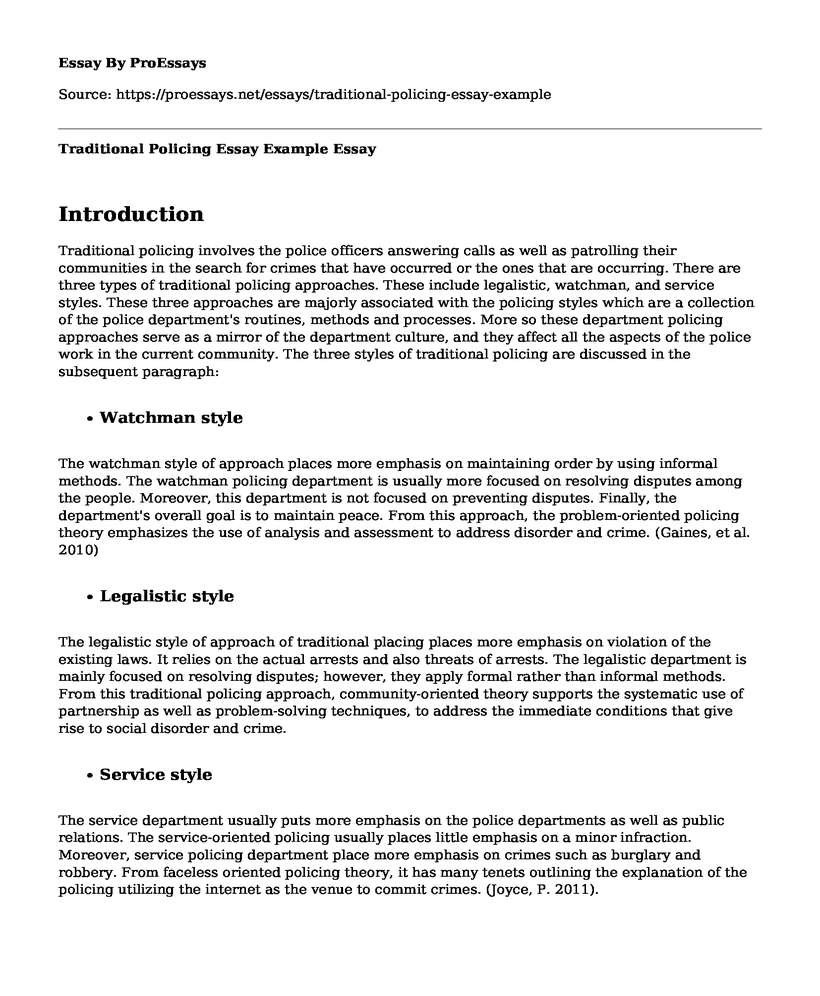Introduction
Traditional policing involves the police officers answering calls as well as patrolling their communities in the search for crimes that have occurred or the ones that are occurring. There are three types of traditional policing approaches. These include legalistic, watchman, and service styles. These three approaches are majorly associated with the policing styles which are a collection of the police department's routines, methods and processes. More so these department policing approaches serve as a mirror of the department culture, and they affect all the aspects of the police work in the current community. The three styles of traditional policing are discussed in the subsequent paragraph:
-
Watchman style
The watchman style of approach places more emphasis on maintaining order by using informal methods. The watchman policing department is usually more focused on resolving disputes among the people. Moreover, this department is not focused on preventing disputes. Finally, the department's overall goal is to maintain peace. From this approach, the problem-oriented policing theory emphasizes the use of analysis and assessment to address disorder and crime. (Gaines, et al. 2010)
-
Legalistic style
The legalistic style of approach of traditional placing places more emphasis on violation of the existing laws. It relies on the actual arrests and also threats of arrests. The legalistic department is mainly focused on resolving disputes; however, they apply formal rather than informal methods. From this traditional policing approach, community-oriented theory supports the systematic use of partnership as well as problem-solving techniques, to address the immediate conditions that give rise to social disorder and crime.
-
Service style
The service department usually puts more emphasis on the police departments as well as public relations. The service-oriented policing usually places little emphasis on a minor infraction. Moreover, service policing department place more emphasis on crimes such as burglary and robbery. From faceless oriented policing theory, it has many tenets outlining the explanation of the policing utilizing the internet as the venue to commit crimes. (Joyce, P. 2011).
Are these various approaches effective?
These approaches are effective since they emphasize on the maintenance of order in the society, solving disputes among the people and fighting criminal activities such as burglary and robbery.
It is always a challenge for a researcher to change the perception of the public as well as that of law enforcement agencies about the traditional policing theories and approaches because the theory and approaches are not applied to cybercrimes. Also, the visible aspects of this aspect of the offence are not presented and can be drastically altered.
References
Gaines, Larry K., & Kappeler, Victor E. (2018). Policing in America. Routledge.
Joyce, P. (2011). Policing: Development & contemporary practice. London: SAGE.
Cite this page
Traditional Policing Essay Example. (2022, Jul 07). Retrieved from https://proessays.net/essays/traditional-policing-essay-example
If you are the original author of this essay and no longer wish to have it published on the ProEssays website, please click below to request its removal:
- Paper Example on Thematic Concerns Featured During Malcolm's Time in The United States
- Research Paper on Private Prisons in the US
- Essay Sample on Campus Crimes
- Punishing the Guilty: Utilitarian, Retributivist, & Teleological Perspectives - Essay Sample
- Essay Example on Insure-All Corp. Liable for Failing to Carefully Insure AR Homes?
- Essay on the Fight Against America's Drug Problem: The Role of Villages & Police
- Free Case Study Sample on Oil Platform Event: US Response to Iran's Attack in 1987-88







